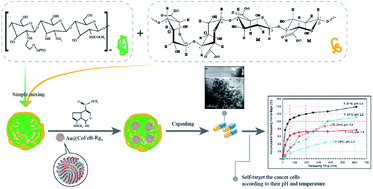Synthesis of nanomedicine hydrogel microcapsules by droplet microfluidic process and their pH and temperature dependent release†
Abstract
Chitosan and alginate hydrogels are attractive because they are highly biocompatible and suitable for developing nanomedicine microcapsules. Here we fabricated a polydimethylsiloxane-based droplet microfluidic reactor to synthesize nanomedicine hydrogel microcapsules using Au@CoFeB–Rg3 as a nanomedicine model and a mixture of sodium alginate and PEG-g-chitosan crosslinked by genipin as a hydrogel model. The release kinetics of nanomedicines from the hydrogel were evaluated by simulating the pH and temperature of the digestive tract during drug transport and those of the target pathological cell microenvironment. Their pH and temperature-dependent release kinetics were studied by measuring the mass loss of small pieces of thin films formed by the nanomedicine-encapsulating hydrogels in buffers of pH 1.2, 7.4, and 5.5, which replicate the pH of the stomach, gut and blood, and cancer microenvironment, respectively, at 20 °C and 37 °C, corresponding to the storage temperature of hydrogels before use and normal body temperature. Interestingly, nanomedicine-encapsulating hydrogels can undergo rapid decomposition at pH 5.5 and are relatively stable at pH 7.4 at 37 °C, which are desirable qualities for drug delivery, controlled release, and residue elimination after achieving target effects. These results indicate that the designed nanomedicine hydrogel microcapsule system is suitable for oral administration.



 Please wait while we load your content...
Please wait while we load your content...